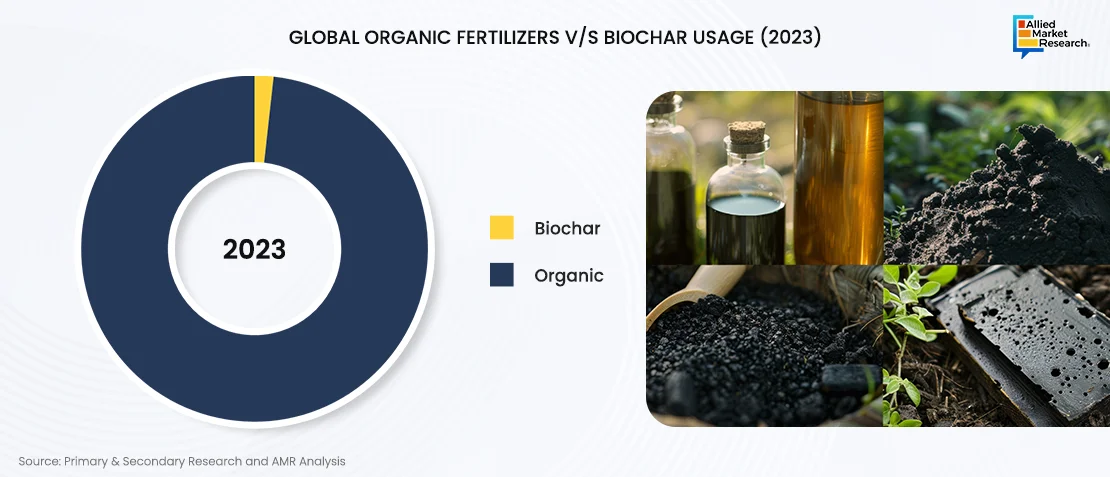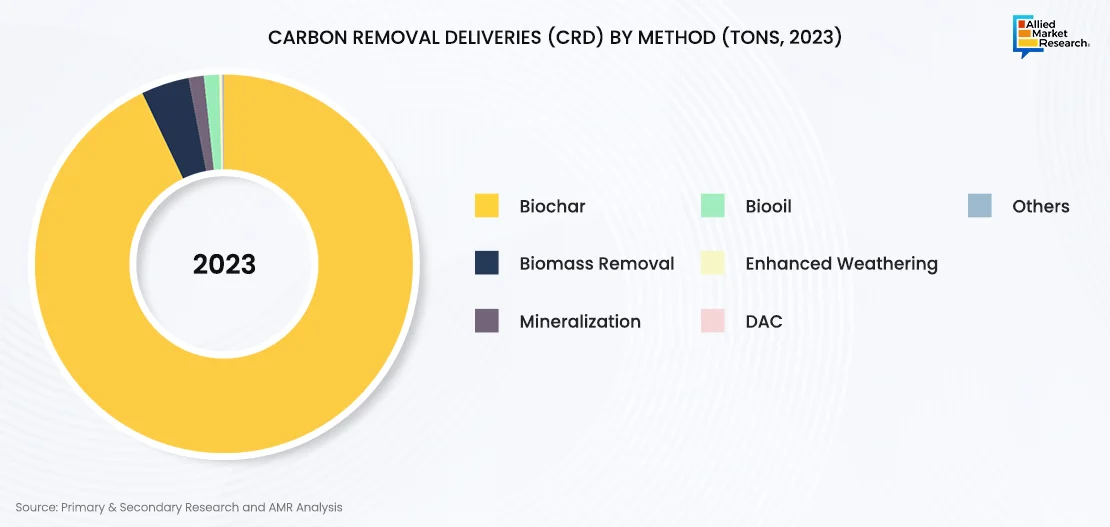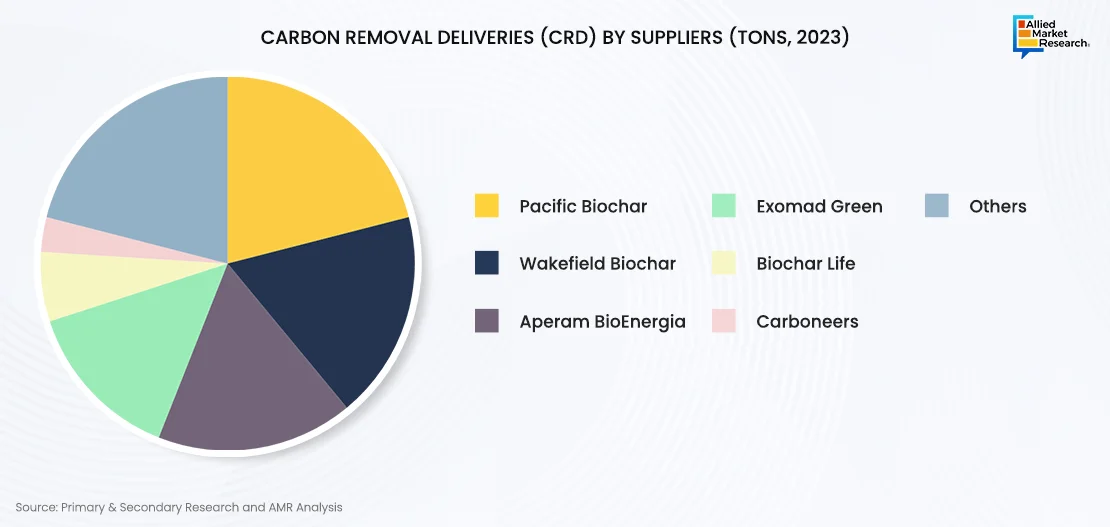Table Of Contents

Yerukola Eswara Prasad

Koyel Ghosh
Discussing the True potential of Biochar: An understanding into Its Growth Prospects

Biochar is a type of charcoal created by pyrolyzing biomass without the presence of oxygen. It is a porous, carbon rich solid that possesses cation exchange capacity (CEC). It is widely used in soil amendment applications to enhance the soil quality, and plant nutrition. In addition to this, it is used as a prime animal feed supplement to enhance digestion, blood formation, and nutrition intake efficiency. The global biochar market is expected to grow at more than 13% between 2022 and 2031.
Growing Demand for Biochar as a Sustainable Soil Amendment
Biochar acts as a soil amendment compound, which is mainly used to enhance soil quality. It possesses a highly permeable structure with a large surface area, enabling it to effectively retain water and nutrients. Biochar, with its high CEC, retains nutrients effectively and makes them accessible to plants. Additionally, its porous structure and unique surface chemistry enable it to absorb various contaminants, such as heavy metals and organic pollutants.
This charcoal improves the soil’s water retention capacity, due to which it can be used in draught prone areas. Compared to natural alternatives, chemical or synthetic fertilizers do not retain well in the soil or exhibit water retention capacity, making them prone to runoff into local water bodies. This is the primary reason why this carbon significantly enhances soil fertility in contrast to synthetic fertilizers such as potassium, nitrogen, or ammonia-based options. It helps in mitigating climate change by locking large volumes of carbon in the soil for long time durations. Additionally, it offers a sustainable solution for recycling agricultural and forestry waste, transforming it into a valuable resource. Fertilizers are additional compounds incorporated into soil to increase the nutrient content for increasing the crop yield. These fertilizers can be organic or synthetic in nature, which are mainly used to increase the nitrogen, potassium and phosphorous content in the soil. In the past few years, organic fertilizers have been gaining increased traction. With the widely recognized long-term detrimental effects of chemical and synthetic fertilizers, there has been a noticeable shift in consumer preferences toward organic fertilizers.
Simultaneously, this type of charcoal not only helps sequester carbon in the soil but also reduces emissions of nitrous oxide and methane. Additionally, it immobilizes heavy metals and organic pollutants, preventing them from leaching into groundwater and reducing soil contamination. It improves soil structure by increasing porosity, which enhances root penetration, aeration, and water infiltration. This high porosity makes water more available to plants during dry periods, thereby improving drought resistance. By promoting the growth of beneficial soil microbes essential for nutrient cycling and organic matter decomposition, biochar enhances soil health and fertility in a natural and sustainable way. Its production cycle recycles agricultural and forestry waste sustainably, reducing the need for environmentally harmful landfills and open burning.
While the initial cost of biochar production and application might be higher, its long-term benefits and reduced need for repeated applications can make it a more cost-effective solution over time. Also, by improving soil health and nutrient retention, it can reduce the need for other soil amendments compounds and fertilizers, thus lowering overall input costs for farmers over a long period. The production and use of synthetic fertilizers often contributes to environmental issues such as soil degradation, water pollution, and increased greenhouse gas emissions. Biochar, in contrast, offers a more sustainable and environmentally friendly option. These are the factors that make biochar a preferred choice of product for farmers as compared to synthetic.
Biochar presents significant opportunities for enhancing environmental sustainability, economic viability, and social well-being. Its ability to improve soil health, sequester carbon, reduce pollution, and enhance agricultural productivity makes it a valuable tool in sustainable land management and climate change mitigation.
Analyzing Key Parameters to Observe Biochar Growth Patterns
Increasing awareness toward organic fertilizers
The growing population has surged the demand for crops, which in turn has generated better momentum for agricultural sector. For better crop yield, farmers use fertilizers and other compounds, which can include synthetic fertilizers, organic fertilizers, manure and others. In the past years, the consumer preference toward organic farming has been growing significantly, which includes the use of organic fertilizers, manure & compost and others. Growing awareness of environmental sustainability and the harmful effects of synthetic fertilizers have increased the demand for organic alternatives. For instance, the per hectare yield of wheat in India was 3.54 tons as compared to UK which was the highest globally at 8.59 tons in 2022. Similarly, the per hectare yield of rice in India was 4.23 tons as compared to Peru which was 8.33 tons in 2022. As a result, the demand for organic fertilizers is rising to ensure a sustainable yield growth in agricultural economies such as India, Brazil, Italy, and so on.
In May 2024, Suez, a leading provider of environmental services from France, expanded its partnerships significantly. Towards the end of the month, Suez strengthened its collaboration with North American company Airex Energy, with whom they are jointly establishing a biochar production facility in Canada.
On the other hand, Swiss Re, a major reinsurance company, has entered a seven-year agreement with Carbonfuture, a carbon removal solutions provider. Under the contract, Swiss Re will purchase at least 70,000 tonnes of Biochar Carbon Removal (BCR) credits from Carbonfuture's partner, Exomad Green, operating a new facility in Riberalta, Bolivia.
As seen in the above figure, biochar constitutes just 2% of the organic fertilizer industry currently. However, various countries are promoting various incentive programs to increase its usage, mainly for organic fertilizers and biochar. Canada is growing rapidly owing to factors such as increasing demand for crops, attractive government policies, and increasing government spending to promote agricultural activities where it is used to improve the plant nutrition, fertility, and overall crop yield. This is expected to boost the sales of this carbon, creating profitable opportunities for the industry in the coming years. Also, in U.S. the Climate Action Reserve is developing a “U.S. and Canada Biochar Protocol”, which will provide recommendations and guidelines for quantification, monitoring, report, and verification of climate benefits from the production and use of biochar. A further course of action is anticipated soon regarding Board Approval.

Carbon Sequestration
It also plays a significant role in carbon sequestration, which is the process of capturing and storing atmospheric carbon dioxide to mitigate or defer global warming and climate change. The production of this charcoal contains a high percentage of carbon, typically ranging from 50% to 70% by weight, depending on the feedstock and pyrolysis conditions. It is highly stable in soil, with a mean residence time ranging from hundreds to thousands of years. This stability ensures that the carbon remains sequestered for long periods. Biochar contributes to the overall increase in soil organic carbon (SOC), enhancing soil fertility and structure.
Furthermore, the high cation exchange capacity (CEC) helps retain essential nutrients, making them more available to plants and reducing the need for chemical fertilizers. By improving soil aeration and reducing denitrification, biochar can lower emissions of methane (CH4) and nitrous oxide (N2O), both potent greenhouse gases. Biochar is a promising tool for carbon sequestration, offering a durable and stable means of storing carbon in soils. Its benefits extend beyond carbon sequestration, enhancing soil health, increasing agricultural productivity, and reducing greenhouse gas emissions. Despite challenges such as production costs and scalability, the integration of biochar into sustainable agricultural practices holds significant potential for climate change mitigation and environmental sustainability. According to a study by Chemists Without Borders, 1 ton of biochar sequesters 3 tons of carbon dioxide.
As illustrated, biochar is the most effective method for carbon sequestration. In August 2022, Verified Carbon Standard (VCS, international certification body for carbon finance) certified an extraction process recognizing the sequestration properties of this particular type of carbon. Also, nowadays, new potential applications of it are becoming commercially viable. Biochar is being incorporated into different products for use in construction industry; as additives for plastic, paper, and textile manufacturing; in water treatment and so on.
Pacific Biochar is one of the leading companies in the industry which has individually contributed on a large scale to carbon sequestration in its form.

Looking ahead
Biochar is a versatile and promising tool for sustainable farming and fighting climate change. However, there are challenges to making it to be widely used. Producing and applying biochar can be expensive initially. Its quality can vary depending on the materials used and the production process. We also need thorough studies to understand its full environmental impact. Educating farmers and giving them access to specific technology is essential for its success. Despite these obstacles, it has great potential to support sustainable agriculture, improve environmental health, and help combat climate change. With ongoing research, investment, and supportive policies, biochar could significantly contribute to a more sustainable and resilient farming system.

Allied Market Research explores the details of biochar and related products to give vendors thorough insights into this growing field. Our carefully crafted reports cover technological advancements, market trends, and government initiatives, helping businesses incorporate biochar into their product lines. For more information about materials and chemicals, get in touch with our experts today!

